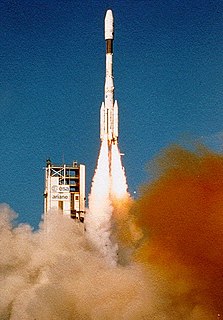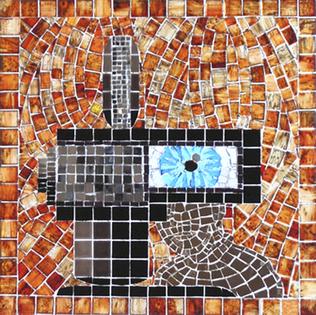
Ariane 5 is a European heavy-lift launch vehicle that is part of the Ariane rocket family, an expendable launch system designed by the French government space agency Centre national d'études spatiales (CNES). It is used to deliver payloads into geostationary transfer orbit (GTO) or low Earth orbit (LEO).

Vulcans are a fictional extraterrestrial humanoid species in the Star Trek universe and media franchise. In the various Star Trek television series and movies, they are noted for their attempt to live by logic and reason with as little interference from emotion as possible. Known for their pronounced eyebrows and pointed ears, they originate from the fictional planet Vulcan. In the Star Trek universe, they were the first extraterrestrial species to make contact with humans.

Ariane is a series of a European civilian expendable launch vehicles for space launch use. The name comes from the French spelling of the mythological character Ariadne. France first proposed the Ariane project and it was officially agreed upon at the end of 1973 after discussions between France, Germany and the UK. The project was Western Europe's second attempt to develop its own launcher following the unsuccessful Europa project. The Ariane project was code-named L3S.

Ariane 1 was the first rocket in the Ariane family of expendable launch systems. It was developed and operated by the European Space Agency (ESA), which had been formed in 1973, the same year that development of the launch had commenced.

Yoko Tsuno is a comics album series created by the Belgian writer Roger Leloup published by Dupuis in Spirou magazine since its debut in 1970. Through twenty-nine volumes, the series tell the adventures of Yoko Tsuno, a female electrical engineer of Japanese origin surrounded by her close friends, Vic Video and Pol Pitron. Their adventures bring them to, among other places, Belgium (Bruges), Germany, Scotland, Japan, Hong Kong, Indonesia and also into outer space. The stories are heavily technology driven, with concepts like robot dragons, suspended animation, time travel, and even an alien species called the Vineans. Despite the often exotic settings and science-fiction plot lines, the stories generally remain realistic on the personal level between the characters and friendship, love and spirituality are some of the key themes of the series. The art is drawn in Ligne claire style, although having originally started out in the Marcinelle style. When depicting real-world settings, Leloup aspires to be as true to reality as possible, with places like Burg Katz or Rothenburg ob der Tauber depicted with almost photographic skill.

The gas-generator cycle is a power cycle of a bipropellant rocket engine. Some of the propellant is burned in a gas generator and the resulting hot gas is used to power the engine's pumps. The gas is then exhausted. Because something is "thrown away" this type of engine is also known as open cycle.
"The Forge" is the seventh episode of the fourth season of the American science-fiction television Star Trek: Enterprise, and originally aired on November 19, 2004, on UPN. Directed by Michael Grossman, the script was written by Judith and Garfield Reeves-Stevens, and formed the first part of a three-episode arc which continued in "Awakening" and concluded in "Kir'Shara".

Vulcain is a family of European first stage rocket engines for Ariane 5 and the future Ariane 6. Its development began in 1988 and the first flight was completed in 1996. The updated version of the engine, Vulcain 2, was first successfully flown in 2005. Both members of the family use liquid oxygen/liquid hydrogen cryogenic fuel. The new version under development for Ariane 6 will be called Vulcain 2.1.

Star Trek: Countdown is a four-issue comic book prequel to the 2009 film Star Trek by IDW Publishing. It follows the characters of Spock and the Romulan Nero during the year 2387, detailing the events that cause them to travel to the 23rd century. The story serves as both a lead up to the film, and as a continuation of the Star Trek: The Next Generation franchise.

The Vulcan Award of the Technical Artist is an independent film award created in 2003. It rewards the work of a technician for his or her collaboration in the creation of a film from the official selection of the Cannes Film Festival. It is awarded by a special jury, appointed by the Superior Technical Commission of Image and Sound.
Hot Bird 7 was a French communications satellite which was lost in a launch failure in 2002. Intended for operation by Eutelsat, it was to have provided direct to home broadcasting services from geostationary orbit as part of Eutelsat's Hot Bird constellation at a longitude of 13 degrees east. Hot Bird 7 was intended to replace the Hot Bird 3 satellite which had been launched in 1997.

Ariane 6 is a launch vehicle developed and manufactured by ArianeGroup under the authority of the European Space Agency (ESA), with a first test flight scheduled for 2020. When development is completed, it will become the newest member in the Ariane launch vehicle family. The final design was selected in December 2014, favoring a liquid-fuelled core with large solid rocket boosters over the initial solid-fuel rocket design. The motivation for Ariane 6 is to replace Ariane 5 at half the cost, and allow double the number of launches each year.
Liquid Fly-back Booster (LFBB) was a German Aerospace Center's (DLR's) project concept to develop a reusable liquid rocket booster for Ariane 5 in order to significantly reduce the high cost of space transportation and increase environmental friendliness. LFBB would replace existing solid rocket boosters, providing main thrust during the liftoff. Once separated, two winged boosters would perform an atmospheric entry, fly back autonomously to the French Guiana, and land horizontally on the airport like an airplane.
The Institute of Space Propulsion in Lampoldshausen is one of the eight research centers of the German Aerospace Center (DLR).
The Prometheus rocket engine is a European Space Agency development effort to create a reusable methane-fueled rocket engine potentially for the Ariane 6 or its successor rocket.

Vulcan Presenting Venus with Arms for Aeneas is a painting of 1757 by François Boucher in the Louvre in Paris. He produced it as the basis for one of a set of tapestries on The Loves of the Gods. It depicts the homely but muscular Vulcan on the ground in the right, offering up to the more celestial Venus the weapons he has forged for her son Aeneas.

Vulcain is a Swiss Watchmaker that was founded in 1858 by Maurice Ditisheim as Manufacture Ditisheim' in La Chaux-de-Fonds, being rebranded as Vulcain in 1894. In 1947, Vulcain developed the first alarm watch, the Vulcain Cricket.











